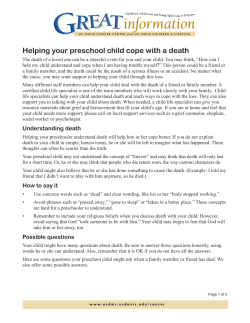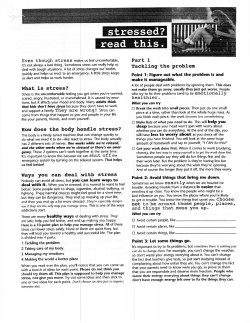
make the difference! Nurture your preschooler’s creativity
September 2014 Vol. 19, No. 1 ® Camden County Public Schools make the difference! Nurture your preschooler’s creativity Eight easy ways to ease your child’s transition to preschool S tarting preschool can be scary for kids. They’re entering a new world full of unfamiliar adults, kids, rules and surroundings. Even children who already have their first year of preschool under their belts tend to have a few backto-school jitters. Here are eight things you can do to make the transition easier: 1. Visit the school. Show your child around and introduce him to his teacher, if possible. 2. Meet children who will be in your child’s class. Consider scheduling a play date with a classmate. 3. Read books about school. Wemberly Worried by Kevin Henkes and The Kissing Hand by Audrey Penn are two popular books about the first day of Copyright © 2014, The Parent Institute® school. Your librarian can also recommend other titles. 4. Describe your own first day of school. If you were nervous, remind your child that this feeling didn’t last long. 5. Point out happy kids who are eagerly walking into preschool. Talk about how excited they seem. 6. Talk about all of the fun things he gets to do in preschool, such as listening to stories and playing games. 7. Be positive. Don’t say things like, “I’m so sad. I wish you were staying home!” 8. Do something special after the first week of school. Celebrate with an ice cream cone, a trip to the playground or another treat. The best time to nurture children’s creativity is in early childhood. It’s before they’re caught up in the responsibilities of school. The first step in promoting creativity is to show your child that you value it. Here’s how: • Allow freedom. Let your child pursue art activities that interest her. Don’t hover over everything she does. Avoid offering assistance that might not be needed. • Be encouraging. Praise effort and creativity, rather than the actual product. For example say, “This is interesting. Tell me about it,” instead of “That’s a beautiful drawing.” • Ask questions that allow for varied answers. If there’s only one right answer, it’s not the best question. • Expect a mess. Buy washable art supplies. Protect household items during messy activities. Resist cleaning up your child’s projects before she’s finished. Source: K. Meador, “Creativity Shows Up Early and in Many Ways,” Parenting for High Potential, National Association for Gifted Children. Source: E. Nechas and D. Foley, What Do I Do Now? Fireside. www.parent-institute.com Practical ideas for parents to help their children Copyright © 2014, The Parent Institute® www.parent-institute.com Expand your child’s world and mind by going on adventures Adventures are an important part of your child’s foundation for learning. And they don’t need to be fancy. Whenever your child sees or does something that’s new to him, that’s an adventure. Plan a few adventures this fall to help your child explore: • Jobs people do. When you visit your doctor or dentist, encourage your child to ask them about their work. Stop by your local fire station. Point out people working at construction sites, the grocery store, the dry cleaners and restaurants. Talk with your child about the work employees do there. • Animals. Visit a nearby zoo or aquarium. There your child can see animals that he may otherwise only see in books or on television. Take a trip to a local farm, petting zoo or pet store. • Other cultures. With your child, visit a restaurant that features the food of another nation. Or check out a cookbook from the library and select a few recipes to try. Let your child help you prepare them. If your town has ethnic festivals, attend them together. Read children’s books and watch movies about characters from other cultures. Look online or ask your librarian for suggestions. Source: S. Parsons, “Experience Needs to Come First,” National Dropout Prevention Center Newsletter, Clemson University. “It is time for parents to teach young people that in diversity there is beauty and there is strength.” —Maya Angelou A good night’s sleep is crucial for your child’s developing brain You probably know that sleep is necessary for your child’s growing body. But did you know that sleep actually helps your child’s brain work better, too? Getting enough sleep each night allows your child to be more alert, pay closer attention and remember material with greater accuracy the next day. To help your child get the recommended 11 to 13 hours of sleep each night: • Develop a sleep schedule. Have your child go to bed and wake up about the same time each day. Try to keep the same schedule on the weekends, too. • Get your child active and outdoors. Exercise and fresh air help kids sleep better. • Follow a bedtime routine. Take a bath, put on pajamas, brush teeth, read a brief story. Talk about something positive from the day. Then, it’s time for lights out. • Make her feel safe. Put a night light in your child’s room. Tell her you will check on her. Source: J. Mindell and J. Owens, A Clinical Guide to Pediatric Sleep: Diagnosis and Management of Sleep Problems, Lippincott Williams & Wilkins. 2 • Early Childhood • Parents make the difference! • September 2014 Are you teaching your preschooler to be respectful? Showing respect for teachers and friends is critical to success in school and life. Are you teaching your child to respect others? Answer yes or no to the following questions to find out: ___1. Do you model respectful behavior? This includes showing respect for your child and for others in your daily interactions. ___2. Do you teach polite language such as please, thank you and may I? ___3. Do you encourage your child to apologize for mistakes? ___4. Do you teach your child to accept people’s differences? Children come from many different cultures and have different likes and dislikes. ___5. Do you give specific praise when your child shows polite and respectful behavior? “Thank you for knocking before coming into my room.” How well are you doing? Mostly yes answers means you are teaching your child the basics of respectful behavior. For no answers, try those ideas. ® make the difference! Practical Ideas for Parents to Help Their Children. ISSN: 1523-1267 1089-3075 For subscription information call or write: The Parent Institute®, 1-800-756-5525, P.O. Box 7474, Fairfax Station, VA 22039-7474. Fax: 1-800-216-3667. Or visit our website: www.parent-institute.com. Published monthly September through May by The Parent Institute®, a division of NIS, Inc., an independent, private agency. Equal opportunity employer. Copyright © 2014 NIS, Inc. Publisher: Phillip Wherry. Editor: Rebecca Hasty Miyares. Illustrator: Joe Mignella. X02230970 www.parent-institute.com Copyright © 2014, The Parent Institute® Simple discipline methods help parents prevent big problems Children need and want to have limits set for them. In fact, children who have been disciplined in a loving manner generally do better in school than those who haven’t. Here are a few simple and effective discipline methods to try: • Enforce reasonable rules. Make a few key rules and stick to them. Consistency makes it easier for preschoolers to cooperate. • Allow give and take. Your child has opinions, and it’s helpful to compromise sometimes. But stand your ground when it really counts. • State things positively. When possible, tell your child what to do (“Put your hands in your lap.”) instead of what not to do (“Stop grabbing!”). • Set a good example. Discipline works best when parents are calm. Show your child how to stay calm when angry. • Criticize carefully. Talk about your child’s behavior, not your child. Say, “That comment was rude” instead of “You are rude.” • Focus on success. Notice what your child does well. Give specific compliments. “You put your art supplies away. You’re taking good care of your things!” Source: N. Paulu, Helping Your Child Get Ready for School, U.S. Department of Education. Make mealtime an important part of your family’s routine Experts agree that family meals are essential for children’s learning. Children who regularly eat at least one meal a day with their families are healthier and have better grades. Family mealtime is even more important than playtime, story time or other family events to increase vocabulary. Eating together as a family will also give your preschooler the perfect opportunity to talk about her day. Try these mealtime tips: • Plan for meals. Let your child help you make menus for the week and create a grocery list. • Be creative. If your family can’t eat dinner together, plan another special meal. Some families eat breakfast together. Others meet for dessert at the end of the day. • Let your child help with meal preparation. She can measure ingredients and stir. Show her how to set and clear the table. • Make mealtime fun. Put dinner in a box or bag. Lay out a blanket inside or outside for a picnic. • Teach manners—napkins in laps, chew with mouth closed, etc. • Keep talk positive. Avoid negative topics or criticism. Have each family member tell one good thing about his or her day. • Start traditions. For example, you might make pancakes on Saturday mornings or eat sandwiches on Sunday nights. The best traditions only need two ingredients: family and fun. Source: “The Importance of Family Dinners III,” The National Center on Addiction and Substance Abuse at Columbia University. Q: My son bursts into tears when I drop him off at preschool. It’s been a week, and things haven’t gotten better. Is there anything I can do to make drop-off less stressful for all of us? Questions & Answers A: It’s always difficult for parents to watch their children fall apart when it’s time to say goodbye. But what’s going on is normal for children of preschool age. Your child is still very dependent on you and being apart makes him feel unsure. With the teacher’s help, you can convince your child that he’ll be safe and cared for at preschool and you will always come back to get him. Here’s how: • Show your child you trust his teacher. Tell him, “If you need help, I want you to ask Mrs. Jones. She will take wonderful care of you.” • Reassure your child about your return. Draw a picture of a clock that shows the time you’ll return. Say, “When the clock on the wall looks like this, I’ll be here.” Or give him something of yours, such as a handkerchief or a photo, to keep with him. • Follow a short goodbye routine with your child. Perhaps you can walk him to his cubby and watch him store his backpack. Then you can give him a hug and kiss, tell him you’ll see him soon, and go. Tears may still fall for the first few weeks, but eventually the routine will be comforting to your child. • Stay in touch with the teacher about how your child does after you leave. Ask her about the activities he seems to like best at school and be sure to talk about them at home. September 2014 • Early Childhood • Parents make the difference! • 3 Copyright © 2014, The Parent Institute® www.parent-institute.com The Kindergarten Experience Teachers share back-to-school tips for success What’s the secret to making sure your kindergartner has a successful school year? Seasoned teachers from around the country weighed in to share their best back-to-school advice. Here’s what they had to say: • Follow routines at home. Children thrive when they have a regular time to eat, sleep, play, read, do chores, etc. • Create daily rituals. Start school mornings eating breakfast together, if you can. Ask about school every evening. And end your day with a bedtime story. • Encourage playing by the rules. Know and talk about classroom rules. Never tell your child you think a rule is silly. • Stay up-to-date on school news. Read the information that comes home from your child’s teacher. • Tell the teacher about any changes at home, such as a new living arrangement or new baby. • Use email, if you can, to contact the teacher. It minimizes “phone tag.” Writing notes works, too. • Don’t say negative things about the teacher in front of your child. He should know that you and the teacher are on the same “team.” • Make homework a priority. Schedule a regular homework time and be there to support your child. • Don’t overschedule your child. Extracurricular activities are great, but children need some downtime, too. Three questions every parent should ask about attendance D on’t let the fun of kindergarten fool you—serious learning is taking place! Research shows that regular attendance in kindergarten sets the stage for future success in school. There are times, of course, when missing school is necessary. To better understand the school’s attendance policy, make sure you find out the answers to these three questions: 1. What should I do when my child can’t come to school? Parents are typically asked to call or email the school office when students will be absent. It is also helpful to write the teacher a note when an absence is planned. 2. What’s the difference between “excused” and “unexcused” absences? Certain absences are generally excused (such as being ill), while others may be unexcused (such as a vacation). If you must schedule an absence during school hours, try to choose the least disruptive time. Also find out the limits on unexcused absences and tardies. 3. Should I request makeup work when my child is absent? Talk with your child’s teacher about her preference. Some teachers like children to complete missed work—even if they’ve only been out a short time. Playful activities can build your child’s emerging literacy skills Most kindergartners are excited about learning how to read. You can keep your child’s desire to read strong with playful ideas like these: • Read the world. Everywhere you go, point out words. See if your child can find the letters of his name in signs. • Visit the public library often and let your child check out books. • Collect “favorite words.” Every day, write down on a card a word your child likes—dog, pizza, ball. Draw a picture of the word on the card. Once you have a stack of words, see if your child can sort them by starting sounds or by the number of syllables. • Encourage your child to pretend to read by retelling a favorite story. Source: J. Hauser, Wow! I’m Reading: Fun Activities to Make Reading Happen—Ages 3 to 7, Williamson Publishing Co. 4 • Early Childhood • Parents make the difference! • September 2014
© Copyright 2025





















